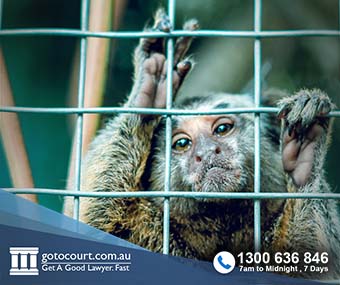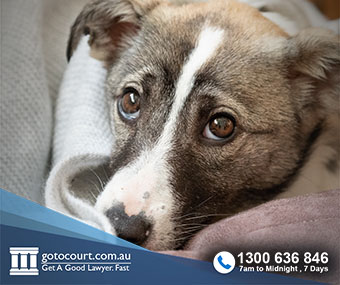Animal Cruelty Offences (NSW)
Animal Cruelty Offences (NSW)
The laws that govern animal cruelty in New South Wales are contained in the Prevention of Cruelty to Animals Act 1979 and the Crimes Act 1900. The Prevention of Cruelty to Animals Act covers the majority of animals in New South Wales and contains a number of animal cruelty offences. These offences can be investigated by the NSW Police, the Royal Society of Prevention of Cruelty to Animals (RSPCA) or Animal Welfare League (AWL). The RSPCA has the power to remove animals which are being mistreated and to enter private properties in order to do so when it has a reasonable suspicion that animal cruelty is occurring. However, the Prevention of Cruelty to Animals Act contains a number of defences that limit the operation of its criminal sanctions.
Animal cruelty offences
Under the Prevention of Cruelty to Animals Act, a person must not commit an act of cruelty to an animal, including unnecessarily or unjustifiably:
- Beating, kicking, killing, wounding, abusing, terrifying or tormenting an animal;
- Overloading, overusing or overdriving an animal;
- Exposing an animal to excessive heat or cold;
- Inflicting pain on an animal.
The act requires a person keeping an animal to do the following:
- Provide food and shelter to animals;
- Exercise confined animals;
- Report injuries to animals.
The act forbids acts and omissions such as:
- Abandoning an animal;
- Poisoning an animal;
- Animal baiting;
- Bull-fighting and trap shooting;
- Docking tails and cropping ears, de-barking dogs, de-clawing cats, or branding the face of an animal;
The act establishes a number of criminal offences relating to animal cruelty. The Crimes Act 1900 also contains animal cruelty offences. The offences and the penalties that apply under those two acts are summarised below:
| Offence | Provision | Maximum penalty for corporation | Maximum penalty for individual |
|---|---|---|---|
| Cruelty to animals | PCAA, Section 5 | Fine of 250 penalty units | Fine of 50 penalty unit, imprisonment for 6 months, or both |
| Aggravated cruelty to animals | PCAA, Section 6 | Fine of 1000 penalty units | Fine of 200 penalty units or imprisonment for 6 months, or both |
| Failing to exercise animal | PCAA, Section 9 | Fine of 250 penalty units | Fine of 50 penalty units, imprisonment for 6 months, or both |
| Abandonment of animal | PCAA, Section 11 | Fine of 250 penalty units | Fine of 50 penalty units, imprisonment for 6 months, or both |
| Performing prescribed procedure on animal | PCAA, Section 12 | Fine of 250 penalty units | Fine of 50 penalty units, imprisonment for 6 months, or both |
| Failing to report injury to animal while driving | PCAA, Section 14 | - | Fine of 50 penalty units, imprisonment for 6 months, or both |
| Poisoning domestic animal | PCAA, Section 15 | Fine of 1000 penalty units | Fine of 200 penalty units, imprisonment for 2 years, or both |
| Selling severely injured animal | PCAA, Section 22 | Fine of 250 penalty units | Fine of 50 penalty units, imprisonment for 6 months, or both |
| Serious animal cruelty | Crimes Act, 530 | - | Imprisonment for 5 years |
| Killing or seriously injuring an animal used for law enforcement | Crimes Act, Section 531 | - | Imprisonment for 5 years |
Defences
Section 24 of the Prevention of Cruelty to Animals Act provides that a person has a defence against any of the animal cruelty offences under that act if the act was done:
- To a stock animal (in the case of lopping, tailing, branding or earmarking) and in a way that caused no unnecessary pain to the animal;
- In the course of hunting, shooting, snaring, trapping, catching or capturing the animal;
- To prepare the animal for food for human consumption in a way that causes no unnecessary pain or in accordance with religious precepts;
- For the purpose of animal research; or
- For the purpose of feeding a predatory animal in a way that is necessary for its survival.
Law reform
Animal rights groups such as Animals Australia (AA) and People for the Ethical Treatment of Animals (PETA) have long been campaigning for animal cruelty laws to be strengthened and for their application to be broadened to encompass industries where cruelty to animals proliferates, such as in factory farming and live exports.
During 2018, animal advocates campaigned to end live exports to the Middle East during the summer months, following revelations that sheep were becoming sick and dying of heat exhaustion on such journeys. The live export industry has agreed to cease such exports between the months of June and August starting in 2019, but lobby groups want this extended to May to October.
The conditions endured by animals such as battery chickens, greyhounds in the racing industry and racehorses have also caused controversy in recent years. The RSPCA supports an end to battery hens, better regulation and scrutiny of the greyhound racing industry and a move to whip-free horse racing.
In 2018, New South Wales Premier Mike Baird announced that the state would ban greyhound racing after footage of live baiting in the industry became public. However, the decision was later reversed in response to community pressure to give the industry another chance.
If you require legal advice in relation to a criminal law matter or in any other legal matter, please contact Go To Court Lawyers.

Affordable Lawyers
Our Go To Court Lawyers will assist you in all areas of law. We specialise in providing legal advice urgently – at the time when you need it most. If you need a lawyer right now, today, we can help you – no matter where you are in Australia.How It Works




1. You speak directly to a lawyer
When you call the Go To Court Legal Hotline, you will be connected directly to a lawyer, every time.

2. Get your legal situation assessed
We determine the best way forward in your legal matter, free of charge. If you want to go ahead and book a face-to-face appointment, we will connect you with a specialist in your local area.

3. We arrange everything as needed
If you want to go ahead and book a fact-to-face appointment, we will connect you with a specialist in your local area no matter where you are and even at very short notice.






















